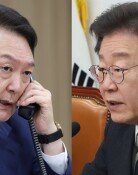[Op-Ed] Policy Coalition
The Federation of Korea Trade Unions is threatening to sever ties with the ruling camp led by the Grand National Party. The problem is a dispute over no salaries to union leaders and approval of multiple unions at a single company, a measure that will take effect in three months. Labor Minister Lim Tae-hee has announced his intent to implement both policies, saying, Korea can no longer afford to delay their implementation in the interest of advancing labor-management relations. The postponement of the policies is now in its 13th year. In response, the federation is threatening to break the policy coalition with the ruling party when it convenes a meeting of representatives next month. Cho Ki-doo, the federations executive vice president for organization, angrily said, How can we continue a policy coalition with a counterpart that seeks to reshuffle the union?
The federation formed the policy coalition in supporting Lee Myung-bak in the 2007 presidential election. It sought to get its policies implemented by the government after Lees election. A number of models exist for unions to form political forces. One way is for unions to establish an independent party, as in Britain. The federation formed a Green Social Democratic Party in the 2004 general elections but won just 0.5 percent of the vote. Having seen no signs of hope after the progressive Democratic Labor Party formed an alliance with the militant Korea Confederation of Trade Unions, the federation believed forming a policy coalition with a certain party would be more effective, as seen in the U.S. and Japan.
A source with the newly merged union of government employees said, Criticism that the entry of the government employees union into the Korea Confederation of Trade Unions will result in its support of the Democratic Labor Party and the infringement of political neutrality by civil servants is a biased view of the conservative group. Yet it is an issue when government workers whose salaries come from taxpayers money join an umbrella union that denies the legitimacy of the Republic of Korea and stages illegal and violent protests. As such, it is wrong to think the policy coalition between the federation and the ruling party is the same as the collusion between the government employees union and the confederation.
Editorial Writer Park Seong-won (swpark@donga.com)







